About 73 percent of employers in Taiwan reported recruitment difficulties, with those trying to hire workers with IT and data skills facing the most significant challenge, a survey released yesterday by human resources advisory firm ManpowerGroup showed.
In its latest global talent shortage report, ManpowerGroup surveyed more than 40,000 people in 41 countries and regions, including 630 in Taiwan, finding that 75 percent of employers worldwide were dealing with a talent shortage, slightly higher than Taiwan’s 73 percent.
In Japan, about 85 percent of employers said they found it hard to fill job vacancies, the highest rate among those surveyed, followed by Germany, Greece and Israel (all 82 percent); Ireland, Portugal and India (all 81 percent); and the UK, France, Canada and Brazil (all 80 percent).
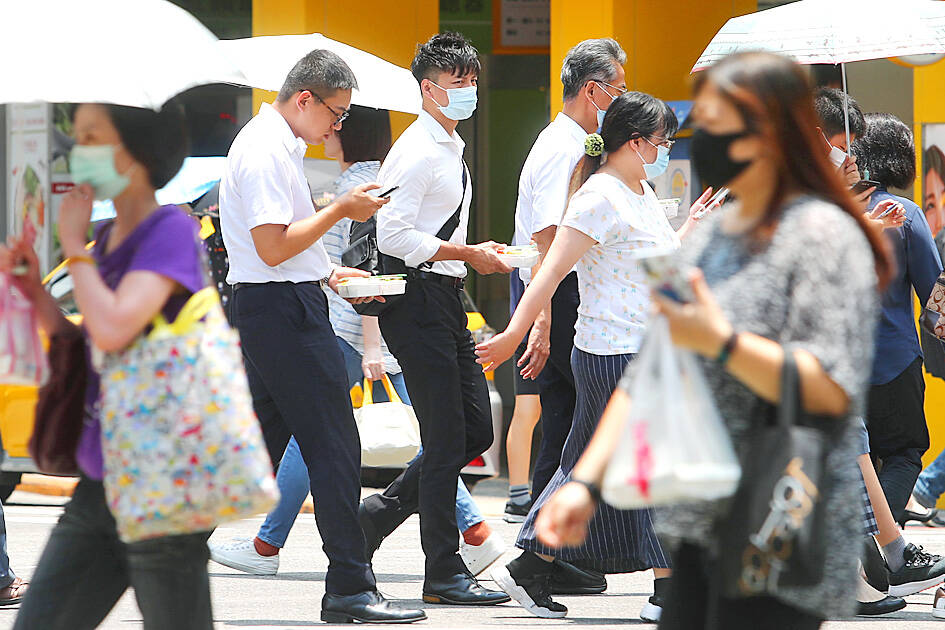
Photo: CNA
About 79 percent of employers in Singapore said they had trouble filling vacancies, while 70 percent surveyed in the US and 69 percent in China also reported hiring issues.
ManpowerGroup Taiwan general manager Joan Yeh (葉朝蒂) said in a statement that talent shortages have become a universal phenomenon.
With the emergence of artificial intelligence (AI) applications, cultivating AI talent has become an important task for employers worldwide, Yeh said.
In Taiwan, 78 percent of employers in the transportation, logistics and auto businesses faced challenges finding talent, the highest of all major industries, followed by industrial and raw materials sectors (77 percent), the survey found.
The talent shortage in the local transportation, logistics and auto industries comes amid an explosion in spending in the post-COVID-19 pandemic era, with many people rushing to take trips and splurge on entertainment activities, which has prompted logistics operators and airlines to expand hiring to meet demand, Yeh said.
Thirty-five percent of employers in Taiwan said that finding workers with IT and data skills was most challenging, ahead of those with engineering skills (26 percent), manufacturing and production skills (24 percent), human resources skills (23 percent), and sustainability and environmental skills (20 percent).
The shortage of workers with IT and data skills reflects the growing demand for AI applications, while many businesses also need employees to analyze data and enhance cybersecurity, Yeh said.
Companies also need to recruit human resources professionals to help them find the right personnel to facilitate AI development, she added.
Tackling the talent shortage would require employers in Taiwan to provide more flexible work schedules, higher compensation and the ability for employees to work remotely, the survey said.
Such flexibility demonstrates a company’s awareness of the importance of retaining, as well as recruiting, talent, Yeh said.
Seventy percent of employers in Taiwan said that they were worried about an economic slowdown, the survey showed.
Based on those concerns, employers are expected to freeze hiring and cut training budgets, which could make it challenging for employees to acquire necessary skills, Yeh said.
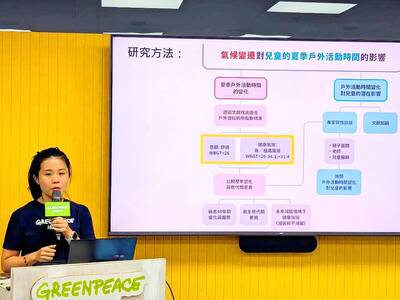
The government should improve children’s outdoor spaces and accelerate carbon reduction programs, as the risk of heat-related injury due to high summer temperatures rises each year, Greenpeace told a news conference yesterday. Greenpeace examined summer temperatures in Taipei, New Taipei City, Taoyuan, Hsinchu City, Taichung, Tainan and Kaohsiung to determine the effects of high temperatures and climate change on children’s outdoor activities, citing data garnered by China Medical University, which defines a wet-bulb globe temperature (WBGT) of 29°C or higher as posing the risk of heat-related injury. According to the Central Weather Administration, WBGT, commonly referred to as the heat index, estimates
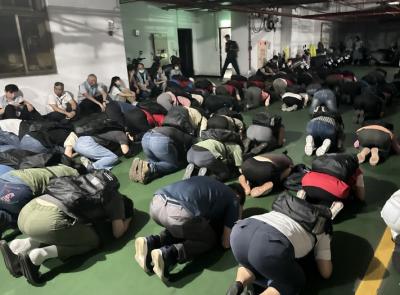
Taipei and other northern cities are to host air-raid drills from 1:30pm to 2pm tomorrow as part of urban resilience drills held alongside the Han Kuang exercises, Taiwan’s largest annual military exercises. Taipei, New Taipei City, Keelung, Taoyuan, Yilan County, Hsinchu City and Hsinchu County are to hold the annual Wanan air defense exercise tomorrow, following similar drills held in central and southern Taiwan yesterday and today respectively. The Taipei Mass Rapid Transit (MRT) and Maokong Gondola are to run as usual, although stations and passenger parking lots would have an “entry only, no exit” policy once air raid sirens sound, Taipei
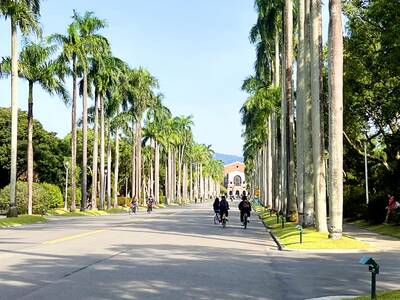
Taipei placed 14th in the Quacquarelli Symonds (QS) Best Student Cities 2026 list, its highest ever, according to results released yesterday. With an overall score of 89.1, the city climbed 12 places from the previous year, surpassing its previous best ranking of 17th in 2019. Taipei is “one of Asia’s leading higher-education hubs,” with strong employer activity scores and students “enjoying their experience of the city and often keen to stay after graduation,” a QS staff writer said. In addition to Taipei, Hsinchu (71st), Tainan (92nd), Taichung (113th) and Taoyuan (130th) also made QS’ list of the top 150 student cities. Hsinchu showed the
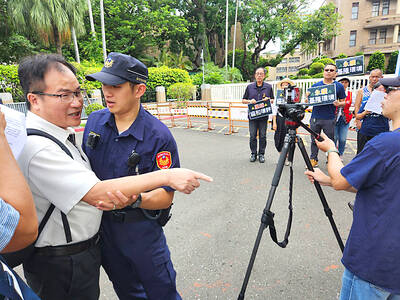
Environmental groups yesterday filed an appeal with the Executive Yuan, seeking to revoke the environmental impact assessment (EIA) conditionally approved in February for the Hsieh-ho Power Plant’s planned fourth liquefied natural gas (LNG) receiving station off the coast of Keelung. The appeal was filed jointly by the Protect Waimushan Seashore Action Group, the Wild at Heart Legal Defense Association and the Keelung City Taiwan Head Cultural Association, which together held a news conference outside the Executive Yuan in Taipei. Explaining the reasons for the appeal, Wang Hsing-chih (王醒之) of the Protect Waimushan Seashore Action Group said that the EIA failed to address